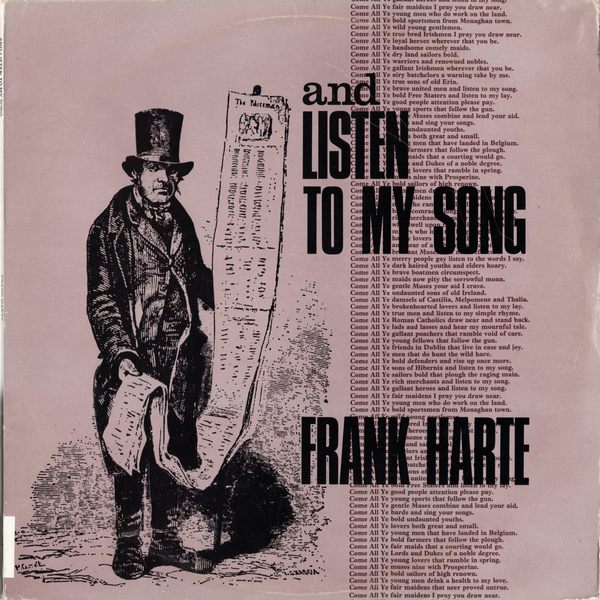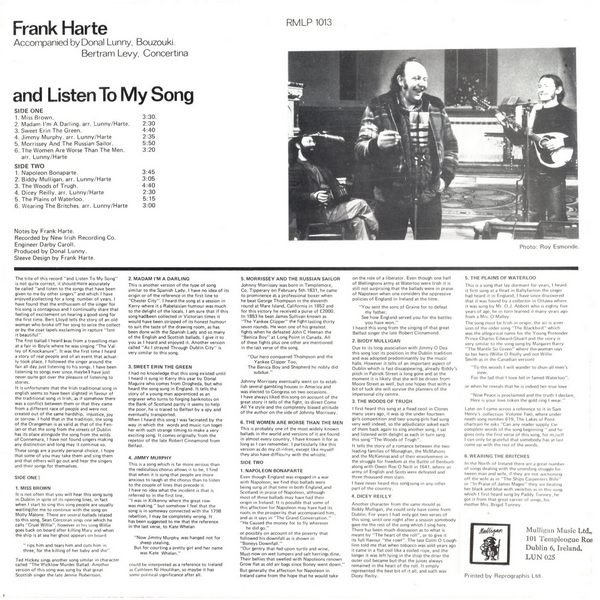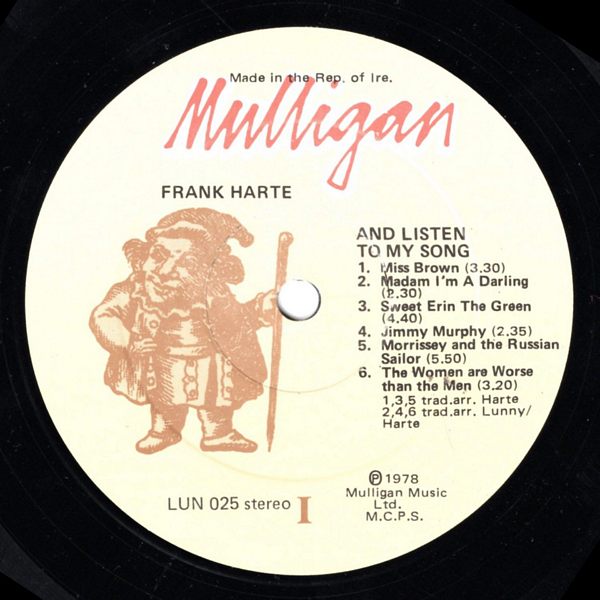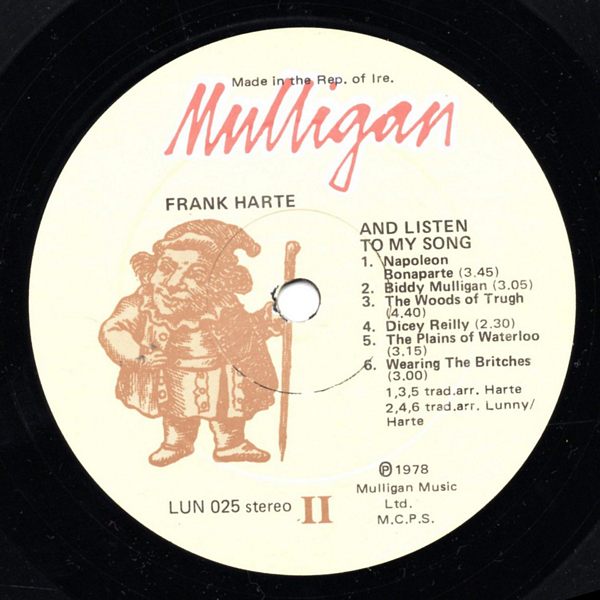
 |


 |
Sleeve Notes
The title of this record "and Listen To My Song" is not quite correct, it should more accurately be called "and listen to the songs that have been given to me by other singers" and which I have enjoyed collecting for a long number of years. I have found that the enthusiasm of the singer for his song is contagious and I continually share that feeling of excitement on hearing a good song for the first time, Bert Lloyd tells the story of an old woman who broke off her song to seize the collector by the coat lapels exclaiming in rapture "Isn't it beautiful".
The first ballad I heard was from a travelling man at a fair in Boyle where he was singing "The Valley of Knockanure", It was the first time I heard a story of real people and of an event that actually took place. I followed the singer around the fair all day just listening to his songs. I have been listening to songs ever since, maybe I have just never quite got over the pleasure of listening to stories.
It is unfortunate that the Irish traditional song in english seems to have been slighted in favour of the traditional song in Irish, as if somehow there was a conflict between them or that they came from a different race of people and were not created out of the same hardship, injustice, joy or sorrow. I hold that in the tradition, the song of the Orangeman is as valid as that of the Fenian or that the song from the streets of Dublin has its place alongside the song from the wilds of Connemara, I have not found singers making any distinction and long may it continue so. These songs are a purely personal choice, I hope that some of you may take them and sing them and that others will go out and hear the singers and their songs for themselves.
MISS BROWN — It is not often that you will hear this song sung in Dublin in spite of its opening lines, in fact when I start to sing this song people are usually waiting for me to continue with the song on Molly Malone. There are several ballads related to this song, Seán Corcoran sings one which he calls "Cruel Willie", however in his song Willie goes back on board after killing Mary and when the ship is at sea her ghost appears on board
"rips him and tears him and cuts him in three, for the killing of her baby and she".
Ted Mickey sings another song similar in character called "The Wicklow Murder Ballad. Another version of this song was sung by that great Scottish singer the late Jennie Robertson.
MADAM I'M A DARLING — This is another version of the type of song similar to the Spanish Lady. I have no idea of its origin or of the reference in the first line to "Chester City". I heard the song at a session in Kerry where it is Rabelaisian humour was much to the delight of the locals. I am sure that if this song had been collected in Victorian times it would have been stripped of its honest humour to suit the taste of the drawing room, as has been done with the Spanish Lady and so many of the English and Scottish ballads. I give it to you as I heard and enjoyed it. Another version called "As I strayed Through Dublin City" is very similar to this song.
SWEET ERIN THE GREEN — I had no knowledge that this song existed until I heard it sung in Kerry this year by Dónal Maguire who comes from Drogheda, but who heard the song sung in England. It tells the story of a young man apprenticed as an engraver who turns to forging banknotes on the Bank of Scotland partly it seems to help the poor, he is traced to Belfast by a spy and eventually transported.
When I heard this song I was facinated by the way in which the words and music run together with such strange timing to make a very exciting song. It comes originally from the repetoir of the late Robert Cinnamond from Belfast.
JIMMY MURPHY — This is a song which is far more serious than the rediculous chorus allows it to be, I find that when it is sung that people are more anxious to laugh at the chorus than to listen to the couple of lines that precede it. I have no idea what the incident is that is referred to in the first line, "I was in Kilkenny where the great row was making." but somehow I feel that the song is in someway connected with the 1798 rebellion, I may be completely wrong. It has been suggested to me that the reference in the last verse, to Kate Whelan
"Now Jimmy Murphy was hanged not for sheep stealing,
But for courting a pretty girl and her name was Kate Whelan."
could be interpreted as a reference to Ireland as Cathleen Ni Houlihan, so maybe it has some political significance after all.
MORRISSEY AND THE RUSSIAN SAILOR — Johnny Morrissey was bom in Templemore, Co. Tipperary on February 5th 1831, he came to prominence as a professional boxer when he beat George Thompson in the eleventh round at Mare Island, California in 1852 and for this victory he received a purse of £2000. In 1853 he beat James Sullivan known as "The Yankee Clipper" the fight lasting thirty seven rounds. He won one of his greatest fights when he defeated John C Heenan the "Benica Boy" at Long Point in Canada. All of these fights plus one other are mentioned in the last verse of the song.
"Our hero conquered Thompson and the Yankee Clipper Too,
The Benica Boy and Shepherd he nobly did subdue."
Johnny Morrissey eventually went on to establish several gambling houses in America and was elected to Congress on two occasions. I have always liked this song on account of the great story it tells of the fight, its direct Come All Ye style and the completely biased attitude of the author on the side of Johnny Morrissey.
THE WOMEN ARE WORSE THAN THE MEN — This is probably one of the most widely known ballads in the world and versions of it are found in almost every country, I have known it for as long as I can remember. I particularly like this version as do my children, except like myself they also have difficulty with the whistle.
NAPOLEON BONAPARTE — Even though England was engaged in a war with Napoleon, we find that ballads were being sung at that time in both England, and Scotland in praise of Napoleon, although most of these ballads may have had their origin in Ireland. It is possible that some of this affection for Napoleon may have had its roots in the prosperity that accompanied him, and as it says in "The Grand Conversation."
"He Caused the money for to fly wherever he did go."
or possibly on account of the poverty that followed his downfall as is shown in "Boneys Downfall."
"Our gentry that fed upon turtle and wine,
Must now on wet lumpers and salt herrings dine,
Their bellies; that swelled with Napoleons renown
Grow flat as old air bags since Boney went down."
But generally the affection for Napoleon in Ireland came from the hope that he would take on the role of a liberator. Even though one half of Wellingtons army at Waterloo were Irish it is still not surprising that the ballads were in praise of Napoleon when one considers the oppressive policies of England in Ireland at the time.
"You sent the sons of Graine for to defeat my father,
See how England served you for the battles you have won."
I heard this song from the singing of that great Belfast singer the late Robert Cinnamond.
BIDDY MULLIGAN — Due to its long association with Jimmy O Dea this song lost its position in the Dublin tradition and was adopted predominantly by the music halls. However it tells of an important aspect of Dublin which is fast disappearing, already Biddy's pitch in Patrick Street is long gone and at the moment it is likely that she will be driven from Moore Street as well, but one hopes that with a bit of luck she will survive the planners of the impersonal city centre.
THE WOODS OF TRUGH — I first heard this song at a flead ceoil in Clones many years ago, it was in the under fourteen girls competition and two young girls had sung very well indeed, so the adjudicator asked each of them back again to sing another song, I sat and listened with delight as each in turn sang this song "The Woods of Trugh".
It tells the story of a romance between the two leading families of Monaghan, the McMahons and the McKennas and of their envolvement in the struggle for freedom at the Battle of Benburb along with Owen Roe O Neill in 1641, where an army of English and Scots were defeated and three thousand men slain.
I have never heard this song sung in any other part of the country.
DICEY REILLY — Another character from the same mould as Biddy Mulligan, she could only have come from Dublin. For years I had only got two verses of this song, until one night after a session somebody gave me the rest of the song which I sing here. There has been much discussion as to what is meant by "The heart of the roll", or to give it its full flavour "the rowl". The late Colm O Loughlinn told me that when tobacco was sold years ago it came in a flat coil like a coiled rope, and the longer it was left lying in the shop the drier the outer coil became but that the juices always remained in the heart of the roll. It simply represented the best bit of it all, and such was Dicey Reilly.
THE PLAINS OF WATERLOO — This is a song that lay dormant for years, I heard it first sung at a flead in Ballyfarnon the singer had heard it in England, I have since discovered that it was found by a collector in Ottawa where it was sung by Mr. O.J. Abbott who is eighty five years of age, he in turn learned it many years ago from a Mrs. O Malley.
The song must be Irish in origin, the air is a version of the older song "The Blackbird" which was the allegorical name for the Young Pretender Prince Charles Edward Stuart and the story is very similar to the song sung by Margaret Barry "The Mantle So Green" where the woman says to her hero (Willie O Reilly and not Willie Smith as in the Canadian version)
"To the woods I will wander to shun all men's view,
For the lad that I love fell in famed Waterloo".
or when he reveals that he is indeed her true love
"Now Peace is proclaimed and the truth I declare,
Here is your love token the gold ring I wear."
Later on I came across a reference to it in Sam Henry's collection Volume Two, where underneath song number 619, The Lakes of Pontchartrain he asks "Can any reader supply the complete words of the song beginning" and he gives only the first verse of this song, for myself I can only be grateful that somebody has at last come up with the rest of the words.
WEARING THE BRITCHES — In the North of Ireland there are a great number of songs dealing with the unending struggle between man and wife, if they are not auctioning off the wife as in "The Ships Carpenters Wife" or "In Praise of James Magee" they are beating her black and blue with switches as in this song which I first heard sung by Paddy Tunney, he got it from that great carrier of songs, his mother Mrs. Brigid Tunney.